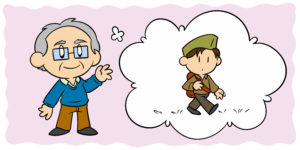To gaze upon the accomplishments of Caitlin Moran is to flirt with a jealously that may take a lifetime to fade. At various times awarded Columnist of the Year, Interviewer of the Year, Critic of the Year, Cultural Commentator of the Year, Writer of the Year, and Ultimate Writer of the Year, Moran has worked as a journalist, a broadcaster, and a successful writer of fiction (The Chronicles of Narmo and How to Build a Girl) and both long and short non-fiction (How to Be a Woman, Moranthology, Moranifesto). So, with her novel How to Be Famous heading for the shelves, what better time to see what advice Moran has for budding authors?
1. Fake it to make it
Moran is frequently generous with advice for young people trying to make it in creative fields, but luckily much of her advice can benefit prospective authors of any age.
Caitlin Moran has been writing for publication since she was a teenager; here’s her advice.Click To TweetOne of the biggest hurdles to progressing as an artist is feeling able to engage with the publishing apparatus, whether that means tackling self-publishing or beginning the process of contacting publishing houses and/or agents. Research is your friend, here – the more you know, the better equipped you are to make good decisions – but Moran also points out that confidence (or at least confident behaviour) precedes success.
…the trick that I found is kind of – when I was thirteen, I wrote my first novel, and I went down to London, to meet all the people who were publishing it. Before I went into that room, to meet all these adults, I thought ‘I can’t go in there! I’m thirteen. I don’t know what to say in that room.’ And the first clever thought I ever had was just ‘pretend to be someone who DOES know what to say in that room’. And it was just like that. And I went in that room pretending to be Courtney Love, pretending to be someone confident and chatty, and the great thing is, if you fake it for long enough, that’s just who you become.
– Caitlin Moran on ‘Caitlin Moran shows us How to Build a Girl’ on q on cbc
2. Don’t let cynicism deprive you of opportunity
Attitude is a big part of Moran’s philosophy, and she doesn’t just suggest it as the route to publication.
In the below quote, Moran addresses the pitfall of cynicism when trying to succeed and share your art. It’s something we covered in Are You Sabotaging Your Own Success? Here’s How To Stop, and a real problem for authors – especially those who are just beginning their foray into professional writing.
For when cynicism becomes the default language, playfulness and invention become impossible. Cynicism scours through a culture like bleach, wiping out millions of small, seedling ideas. Cynicism means your automatic answer becomes “No.” Cynicism means you presume everything will end in disappointment. And this is, ultimately, why anyone becomes cynical. Because they are scared of disappointment. Because they are scared someone will take advantage of them. Because they are fearful their innocence will be used against them – that when they run around gleefully trying to cram the whole world in their mouth, someone will try to poison them.
– Caitlin Moran, How to Build a Girl
Cynicism can impact your writing on multiple levels, whether it manifests as keeping your work private because you’re afraid someone will steal it, refusing to share your writing because you don’t want to be laughed at, or even embracing cliché ideas because you’re not giving the reader enough credit. Breaking free of this sense of cynicism can be the move that transforms your career.
3. Embrace the taboo
Moran is a fan of embracing taboos, even suggesting it as a reliable source for untapped, relatable subject matter.
I’ve never seen a taboo that I didn’t want to grab and drag out into the light and talk about. Whenever I see a taboo subject, I just go ‘look at all this material that no-one’s touching!’ It’s almost as if some kind of weird guy went and put a curse on that area, and went ‘you’re not allowed to talk about this incredibly interesting, common aspect of being a human being.’
– Caitlin Moran on ‘Caitlin Moran shows us How to Build a Girl’ on q on cbc
Moran advocates being unafraid to examine and explore taboo subjects as a way to engage in a constructive, creative discussion that can benefit individual readers and society at large.
Creating without fear opens up new vistas of meaning and relevance.Click To TweetWhenever I see a taboo, I just think that’s something we need to drag screaming out into the light and discuss. Because taboos are where our fears live, and taboos are the things that keep us tiny. Particularly for women.
– Caitlin Moran from Saul Austerlitz’s ‘Caitlin Moran on Taboos, Feminism, And Writing Honestly’
Moran presents confronting the taboo as an exercise in writing truth, and if you make that your goal, you’re aiming to write something genuinely important.
4. Deadlines help you write
In an article that takes the writer’s backside as its main topic, Moran reflects that she has never suffered from writer’s block and attributes this to the fact that deadlines have been ever-present throughout her life.
I’ve never struggled to write – I’ve only had writer’s block for 20 minutes, once. Then I had a cup of tea, and it went away. Obviously I’d like to put this down to being the most brilliant and explosive mind of my generation – but I think it’s simply that I have always had a lot of deadlines. I started writing for cash at the age of 13, and “Bitch gotta make rent” is the cure for any existential wobbles about how to express yourself. If you’re turning over a minimum of 10,000 words a week – this week, working on my new novel, I did 10,000 words IN TWO DAYS – then your conscious mind generally gets out of the way, and you plug straight into your unconscious, instead. For me, the two have now assumed the characteristics of Jeeves and Wooster.
Wooster/Conscious mind: “CRIPES! ANOTHER SCRAPE! It seems I need to write a new book in less than four months!”
Jeeves/Unconscious mind: “Don’t worry about that, sir. It’s all in hand. I’ve assembled all the disconnected thoughts you’ve had about this over the last few years, put them in the correct order, and come up with a pleasingly unexpected opening chapter. All that remains for you to do is smash up your arse for another seven hours by sitting on a chair, typing it out as I dictate, from now until summer. I have, of course, scheduled ‘an hour of dicking around on Twitter at 2pm, every day’, as usual.”
– Caitlin Moran, ‘Caitlin Moran: ‘Were I not a writer, I’d have the peachy, zingy buttocks of Gigi Hadid’
Here, Moran pinpoints one of the most important truths of being a commercially successful (and thus widely read) writer – like goldfish, authors grow to fit the space they’re given. Give yourself a year to write a book and it’ll take, at minimum, a year. Likewise, set deadlines you don’t really intend to enforce, and you’re not establishing the conditions for your writing brain to take over. Specific, frequent deadlines will keep you writing.
5. Publish to improve
Of course, it’s even better if those deadlines are for actual publication, and Moran has made no secret of the fact that her success and skill are the result of consistently writing for an audience.
Recently, Moran discussed her career in music journalism on Twitter, expressing her belief that early, paid, frequent writing was her path to improvement.
So sad the print edition of the NME has closed. The music press was the best way into the media for working-class writers – you got paid to write about what you loved! So hard to learn your craft and earn a living now it’s all down to blogging.
— Caitlin Moran (@caitlinmoran) March 7, 2018
I think it’s very notable that there are so few working-class writers younger than me on the national press. My generation was the last to use the music-press as an entry-point into the media. Where would you start getting that kind of paid experience now?
— Caitlin Moran (@caitlinmoran) March 7, 2018
Unfortunately, Moran is right – the internet has made it easier to be read and harder to get paid for it. There are still opportunities out there for writers looking to hone their craft, and if you want to improve, the message remains the same: find an audience and keep producing work for them.
Write to publish and your craft will improve.Click To Tweet6. Writing is a duet
Perhaps the most important piece of advice for those who want their art to be seen is to start thinking about the reader. Writing is great for self-expression, but it lies flat on the page if the author is writing to write, rather than to be read.
This applies on multiple levels, but crucially to the core concept that the writer and the reader are doing something together, albeit working at different times.
Great writing is a project that the author begins and the reader completes.Click To TweetWhen writers give great advice like pulling back on character description, showing rather than telling, and keeping technical details to a minimum, this is what they’re driving at: leaving space for the reader to finish the story. Authors who write truly great works understand that they’re beginning something that the reader has to finish, and Moran expresses this concept beautifully.
Because what judging a literary prize did was remind me of what I knew when I was eleven, and was wiser, and forgot as I got older, and stupider: that reading is not a passive act… For a reader is not a simple consumer – as you are listening to a record, or watching a movie – they are a co-artist.
Your mind is the projection screen every writer steals; it is the firing of your neurons that makes every book come alive… With a book, you are the landscape, the sets, the snow, the hero, the kiss – you are the mathematical calculation that plots the trajectory of the blazing, crashing Zeppelin… The unseen, life-changing duet you sing with anyone who’s ever written a book.
– Caitlin Moran, ‘Reading is Fierce’ from Moranthology
7. You only have to deal with the next minute
Caitlin Moran is a fount of amazing advice for writers – much of it delivered in discussion of other topics – but the final piece for this article was originally intended and directly addressed to ‘the girls who are having the bad year’, who she frequently meets at book signings.
That context is important, and shouldn’t be forgotten, but it’s also valuable to those writers who don’t feel able to finish and share work that’s vitally important to them. After all, it’s not as if those groups don’t intersect.
If possible, it’s worth hearing Moran read it herself, but since that’s not always convenient, here’s an extract.
Here is a promise, and a fact: you will never, in your life, ever have to deal with anything more than the next minute. However much it feels like you are approaching an event – an exam, a conversation, a decision, a kiss – where, if you screw it up, the entire future will just burn to hell in front of you and you will end, you are not.
That will never happen. That is not what happens.
The minutes always come one at a time, inside hours that come one at a time, inside days that come one at a time – all orderly strung, like pearls on a necklace, suspended in a graceful line. You will never, ever have to deal with more than the next 60 seconds.
Do the calm, right thing that needs to be done in that minute. The work, or the breathing, or the smile. You can do that, for just one minute. And if you can do a minute, you can do the next.
– Caitlin Moran, ‘“You were not born scared and self-loathing”: Read Caitlin Moran’s heartfelt open letter to troubled teenage girls’ from Stylist
Let me know in the comments which of Moran’s best tips I missed and how you’ve applied them in your writing. Or, for more great advice from amazing authors, check out 5 Things Jennifer Egan Can Teach You About Writing, 6 Ways Margaret Atwood Can Help You Improve Your Writing, and 5 Ways J.K. Rowling Can Help You Improve Your Writing.






2 thoughts on “7 Ways Caitlin Moran Can Help You Improve Your Writing”
I love her so much! Thanks for this, it was a delightful surprise when I visited the blog today. 🙂
My pleasure, Jenny – I feel the same way. 🙂